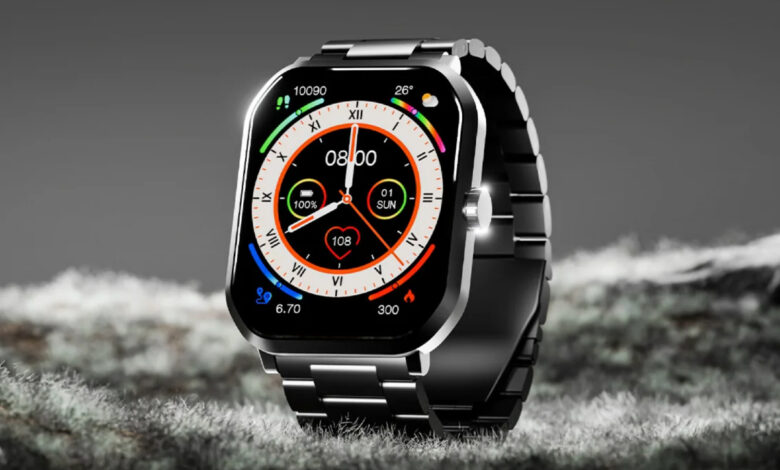Smartwatches shipments see sharp decline in India

India is the second-largest wearable market after China. At times, it has also been the largest smartwatch market. However, in Q2, wearable shipments in the country declined 10% year-on-year to 29.5 million units. The first half of the year, meanwhile, fell 4.7% to 55.1 million units, analyst firm IDC reported this week.
Market analysts believe this decline may widen over the coming quarters, and they place the blame firmly on smartwatches.
According to the survey, smartwatch shipments in India declined by 27.4% YoY to 9.3 million units in Q2, down from nearly 12.8 million. Counterpoint separately confirmed to TechCrunch that according to its analysis, the Indian smartwatch market dipped by as much as 30% YoY.
Earlier this year, TechCrunch reported that Indian smartwatch players faced pressure from the sudden rise of unknown brands. Established names, meanwhile, have failed to distinguish themselves in the market. Some have begun diversifying into other segments, including smart rings, for revenue.
IDC reported the share of smartwatches in the overall wearable market dropped to 31.5% from 39% a year prior.

“Innovation fatigue or hardware exhaustion is the prime reason why the smartwatch market in India is declining,” Vikas Sharma, IDC’s senior market analyst for smart wearable devices, told TechCrunch. “Most local brands are launching models without any new features.”
The top three players in the Indian smartwatch market are all domestic brands: Noise, Fire-Boltt and boAt. All saw a significant dip in Q2. The average selling price of smartwatches in India also declined to $20.6 from $25.6 a year ago as brands have cut prices to clear inventories.
But price cuts have failed to attract customers.
“Consumers are not warming up to buying a new smartwatch or replacing an existing one due to low differentiation in terms of features and limited innovation in the market,” Anshika Jain, a senior analyst at Counterpoint, told TechCrunch.
Jain added that smartwatches’ appeal primarily drove their hyper-growth in India over the past few years. However, she noted that this growth phase is now cooling down as the initial excitement of the segment is tapering off.
“This is also reflected in the dwindling growth rates and a bleak outlook,” the analyst said.
Unlike simpler models, advanced smartwatches (which have an app store and run a full-fledged operating system), saw an increase of 21.9%, with their market share growing to 2.5% from 1.5%, IDC reports.

However, the firm confirmed to TechCrunch that Apple and Samsung saw a decline in their quarterly shipments of around 29% and 26% in their respective market shares.
Apple captured 0.5% of the overall smartwatch market in India by shipping around 35,000–40,000 Apple Watch units in Q2, while Samsung had a 0.9% share with 75,000–80,000 units shipped during the quarter, the firm said.
Sharma said that the market share dip for Apple and Samsung was cyclical.
“Samsung introduced new watches at the end of Q2 along with no bundle offer; also, thanks to online sales, people usually wait for deals to come on higher price watches. For some time, Samsung had stopped the bundle offer [that used to cost its smartwatches to customers at around $36 when purchasing with a flagship smartphone],” he stated.
The analyst also noted that the Apple Watch lineup is due for an update, so the company has largely focused on clearing out old stock.
The overall advanced smartwatch segment saw an increase in its share as some Indian companies launched new models running Android OS. That’s full Android — not Wear OS — along with the Play Store. Some companies refer to the devices as “WristPhones,” as they come with a nano SIM card slot and have voice calling support.
Nevertheless, IDC forecasts the country’s annual smartwatch shipments declining by 10%. Similarly, Counterpoint believes India’s smartwatch will witness a double-digit percentage drop this year.
Headphone shipments flatten
Alongside smartwatches declines, headphones numbers remained flat in India, per IDC, with 20.1 million units shipped in Q2. That represents 0.7% YoY growth. The true wireless stereo (TWS) segment grew 9.1% YoY to a share of 71% from 65.5% a year ago. However, tethered (or neckband-styled) and over-ear headphones — which IDC lumps together — declined by 16.1% to 5.8 million units.
Domestic brands continue to dominate the segment in India, followed by Chinese smartphone vendors Oppo and its sub-brand Realme. Apple (and its subsidiary Beats) and Samsung (including sub-brands JBL, Infinity and Harman), meanwhile, accounted for 0.9% and 2.3% of total headphone shipments.

Sharma of IDC told TechCrunch that the dip in the headphone segment is temporary, as demand for TWS earbuds still exists.
India also receives a significant number of non-branded earbuds, which are available online and in stores. IDC does not track those units, however.
“Q3 will be very big [for headphones] compared to Q2,” Sharma said. In contrast, smartwatches are not likely to see growth until at least 2026, according to Jain.
“In 2026 and beyond, we expect the market to recover, driven by newer use-cases in smartwatches,” she said.
Source link



